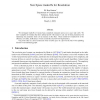Free Online Productivity Tools
i2Speak
i2Symbol
i2OCR
iTex2Img
iWeb2Print
iWeb2Shot
i2Type
iPdf2Split
iPdf2Merge
i2Bopomofo
i2Arabic
i2Style
i2Image
i2PDF
iLatex2Rtf
Sci2ools
STOC
2002
ACM
2002
ACM
Size space tradeoffs for resolution
We investigate tradeoffs of various basic complexity measures such as size, space and width. We show examples of formulas that have optimal proofs with respect to any one of these parameters, but optimizing one parameter must cost an increase in the other. These results have implications to the efficiency (or rather, inefficiency) of some commonly used SAT solving heuristics. Our proof relies on a novel connection of the variable space of a proof to the black-white pebbling measure of an underlying graph.
Related Content
| Added | 03 Dec 2009 |
| Updated | 03 Dec 2009 |
| Type | Conference |
| Year | 2002 |
| Where | STOC |
| Authors | Eli Ben-Sasson |
Comments (0)

